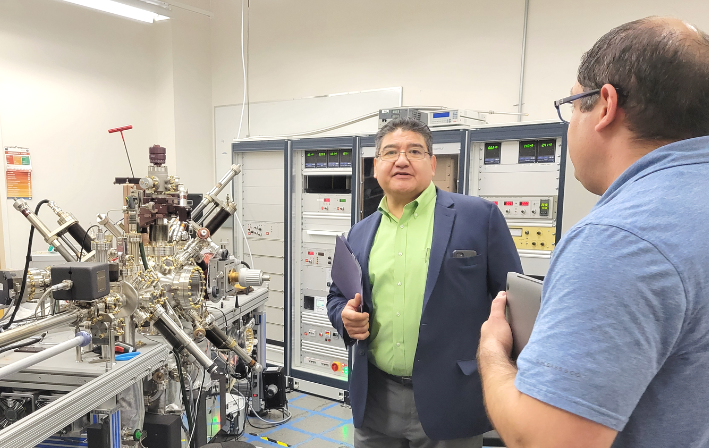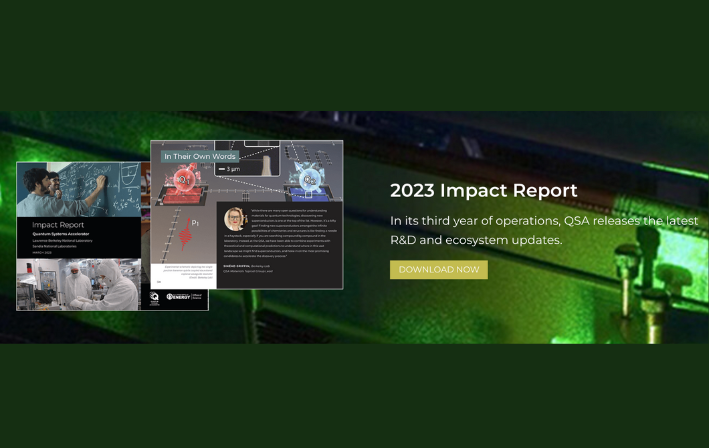In April 2023, QSA hosted the visit of the National Quantum Initiative Advisory Committee (NQIAC) board member Gilbert (Gil) Herrera to Berkeley Lab. Herrera is the Director of the National Security Agency’s (NSA) Research Directorate after a long career in Sandia Labs, where he was named a Laboratory Fellow in 2018. The NQIAC advises the executive branch and federal government at the highest levels about the trends and developments in QIS.
As a Department of Energy (DOE) National QIS Research Center, QSA brings together world-renowned researchers and pioneers of many of today’s unique QIS capabilities and technologies. The cutting-edge research and development at national user facilities in partner institutions leverage the DOE’s rich history of pushing the frontiers of basic science and scientific computing.
At Berkeley Lab, Herrera was joined by several QSA and Berkeley Lab scientists who gave informative talks and detailed tours of the Advanced Light Source and Molecular Foundry, among other labs advancing QIS. The ALS’s x-ray and photoelectron spectroscopy capabilities are currently used to characterize ion traps, their defects, and intrinsic noise sources and determine how these correlate with performance limitations. Similarly, QSA researchers characterize 2D and topological materials with the Molecular Foundry’s nanoscience capabilities and expertise to fabricate quantum devices for improved performance. Several Berkeley Lab facility directors joined the QSA team during the visit.

QSA Deputy Director Bert de Jong and a senior scientist at Berkeley Lab said,
“Frequent exchange is crucial to co-designing new systems at QSA. We were delighted to welcome Gil Herrera for a closer look at how QSA’s science-first approach and mission weave into a cohesive, collaborative Center that propels a growing field forward aligned with the National Quantum Initiative Act, government policies, and industry efforts.”
QSA frequently engages with industry, government labs, international research programs, and other national centers to build and steward the QIS ecosystem collaboratively.



QSA Director Rick Muller and senior manager at Sandia National Laboratories said,
“There are many open questions and challenges to bridge the gap between today’s systems and those that will be capable of impactful science applications. QSA’s vision champions extensive collaborations from a connected, engaged, and diverse research community at all levels.”
QSA is leading the co-design of powerful programmable quantum prototypes that maximize the performance of current hardware in three major platforms: neutral atoms, trapped ions, and superconducting circuits. QSA’s technical areas of interest include Algorithms & Applications, Programmable Quantum Systems, and Integrated Quantum Engineering. To continue reading about QSA’s breakthroughs thus far, download the Center’s latest Impact Report.

Founded in 1931 on the belief that the biggest scientific challenges are best addressed by teams, Lawrence Berkeley National Laboratory and its scientists have been recognized with 16 Nobel Prizes. Today, Berkeley Lab researchers develop sustainable energy and environmental solutions, create useful new materials, advance the frontiers of computing, and probe the mysteries of life, matter, and the universe. Scientists from around the world rely on the Lab’s facilities for their own discovery science. Berkeley Lab is a multiprogram national laboratory, managed by the University of California for the U.S. Department of Energy’s Office of Science. DOE’s Office of Science is the single largest supporter of basic research in the physical sciences in the United States, and is working to address some of the most pressing challenges of our time. For more information, please visit energy.gov/science.
Sandia National Laboratories is a multimission laboratory operated by National Technology and Engineering Solutions of Sandia LLC, a wholly owned subsidiary of Honeywell International Inc., for the U.S. Department of Energy’s National Nuclear Security Administration. Sandia Labs has major research and development responsibilities in nuclear deterrence, global security, defense, energy technologies and economic competitiveness, with main facilities in Albuquerque, New Mexico, and Livermore, California.
The Quantum Systems Accelerator (QSA) is one of the five National Quantum Information Science Research Centers funded by the U.S. Department of Energy Office of Science. Led by Lawrence Berkeley National Laboratory (Berkeley Lab) and with Sandia National Laboratories as lead partner, QSA will catalyze national leadership in quantum information science to co-design the algorithms, quantum devices, and engineering solutions needed to deliver certified quantum advantage in scientific applications. QSA brings together dozens of scientists who are pioneers of many of today’s unique quantum engineering and fabrication capabilities. In addition to industry and academic partners across the world, 15 institutions are part of QSA: Lawrence Berkeley National Laboratory, Sandia National Laboratories, University of Colorado at Boulder, MIT Lincoln Laboratory, Caltech, Duke University, Harvard University, Massachusetts Institute of Technology, Tufts University, UC Berkeley, University of Maryland, University of New Mexico, University of Southern California, UT Austin, and Canada’s Université de Sherbrooke. For more information, please visit https://quantumsystemsaccelerator.org/